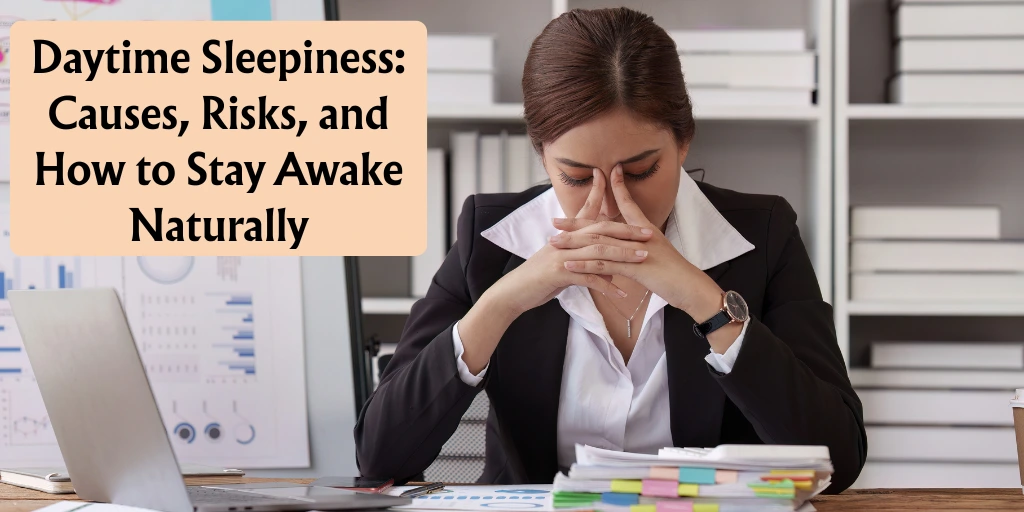It’s more normal than most people think to feel tired and sleepy during the day. Sometimes feeling drowsy in the afternoon is normal, but if you regularly have trouble staying awake during the day, it could be a sign of a health problem, a problem with your lifestyle, or a sleep disorder. Knowing the risks, understanding the causes, and exploring natural ways to stay alert are all critical for improving your overall health.
What is Daytime Sleepiness?
Daytime sleepiness, also called excessive daytime sleepiness (EDS), refers to persistent fatigue or difficulty staying awake during regular waking hours. People with EDS may find themselves nodding off at work, struggling to concentrate, or relying on caffeine and sugar to stay alert.
Unlike general tiredness, which improves with a good night’s sleep, daytime sleepiness often points to deeper issues.
Common Causes of Daytime Sleepiness
1. Sleep Deprivation
It’s most often because they don’t get enough sleep. Adults usually need 7 to 9 hours of sound sleep every night, but many don’t get enough because they are too busy, use screens late at night, or don’t have good sleep habits.
2. Poor Sleep Quality
It doesn’t matter how many hours of sleep you get if you wake up often or have trouble staying asleep. Noise, uncomfortable beds, and habits that don’t always work can all get in the way of deep sleep stages.
3. Sleep Disorders
- Insomnia – having trouble going to sleep or staying asleep.
- Sleep apnea – breathing pauses that disrupt sleep cycles.
- Narcolepsy – people fall asleep suddenly and can’t wake up
- Restless leg syndrome makes it difficult to rest when your legs hurt.
4. Medical Conditions
Feeling tired and sleepy can be caused by health problems like diabetes, Stress, thyroid problems, and heart disease.
5. Medications
If you abuse some prescription drugs, like sedatives, antihistamines, or sleeping pills like Zopiclone, you might feel sleepy the next day.
Some prescription drugs, including sedatives, antihistamines, or sleeping pills like Zopiclone, if misused, may cause grogginess the next day.
6. Lifestyle Factors
- Too much booze or caffeine
- Not moving around enough
- Foods that are bad for you and full of sugar and plastic
Risks of Ignoring Daytime Sleepiness
Being sleepy during the day is not only annoying, but it can also be dangerous. Some risks are:
- Increased accident risk – drowsy driving is just as dangerous as drunk driving.
- Reduced productivity – Having trouble focusing makes it harder to work or study.
- Mental health issues – being tired all the time can make depression and worry worse.
- Long-term health risks – Chronically not getting enough sleep is linked to diabetes, heart disease, and being overweight.
Natural Ways to Combat Daytime Sleepiness
1. Improve Sleep Hygiene
- Keep the same sleep plan every night.
- Make your bedroom dark, quiet, and relaxing.
- Avoid screens at least an hour before bed.
2. Exercise Regularly
Moving around helps you sleep better and stay awake during the day. Going for a short walk outside can help you feel better.
3. Optimize Your Diet
- Whole foods should make up your meals.
- Drink plenty of water all day.
- Stay away from screens at least an hour before bed.
4. Limit Caffeine and Alcohol
Coffee may give you a quick boost, but too much caffeine can make it hard to sleep. Even though alcohol makes you sleepy, it makes your sleep worse.
5. Take Short Power Naps
A 15–20 minute nap can restore alertness without making you groggy. Avoid long naps, as they can disrupt nighttime sleep.
6. Manage Stress
Mindfulness, meditation, or breathing techniques can help your mental health and the quality of your sleep.
When to See a Doctor
If making changes to your lifestyle doesn’t help your symptoms, or if you:
- Snoring loudly and stopping to breathe at night
- Attacks of sudden sleep
- Heavy tiredness despite getting a whole night’s sleep
You should talk to a doctor or nurse. Persistent daytime sleepiness could be a sign of a deeper sleep problem that needs medical help.
Final Thoughts
Being sleepy during the day isn’t just a sign of being tired; it can also be dangerous, harm your health, and reduce your productivity. You can regain your energy and have more productive days by understanding the causes and making positive lifestyle changes. If the problems persist, consulting a doctor will ensure you receive the proper evaluation and treatment.
Better sleep means better life. Start improving your sleep today!






